

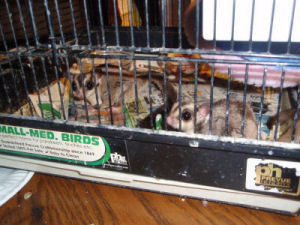
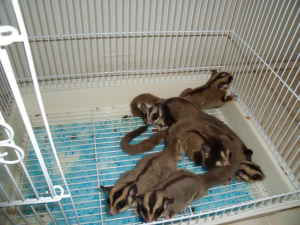
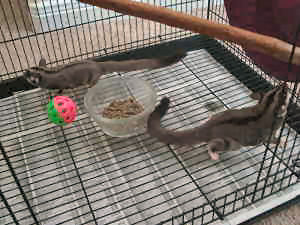
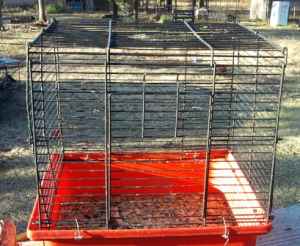
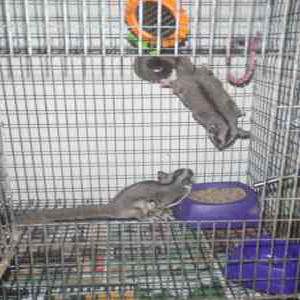
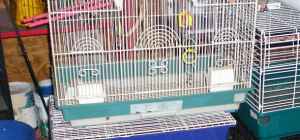
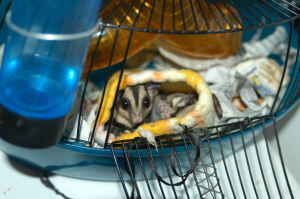
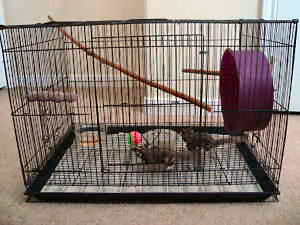
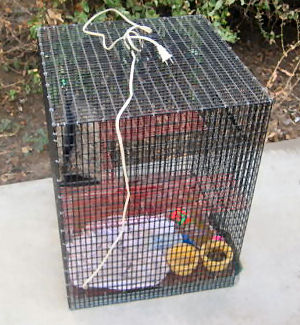
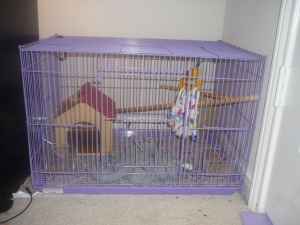
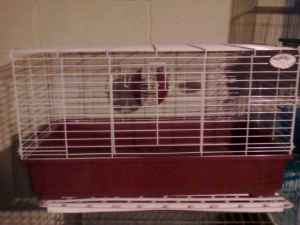
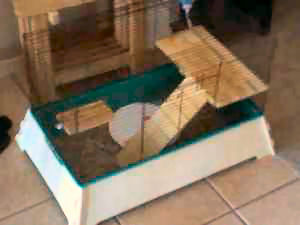
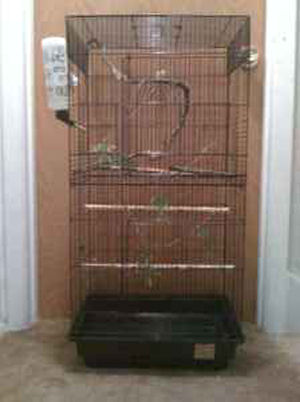
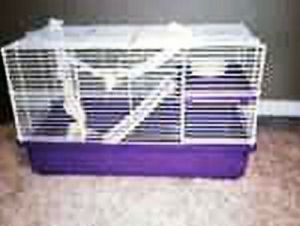
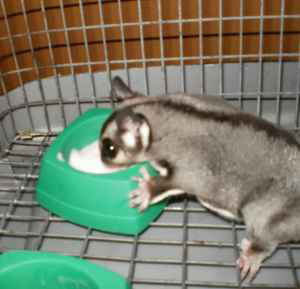
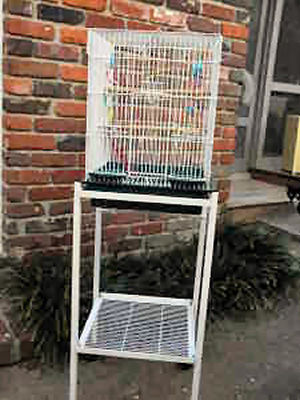
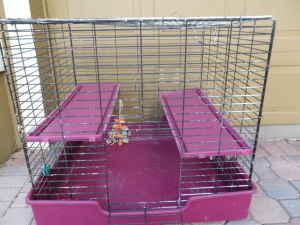
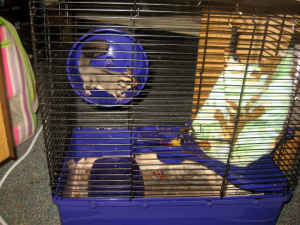
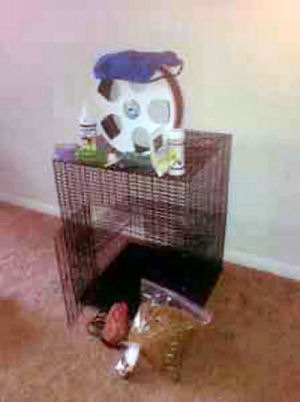
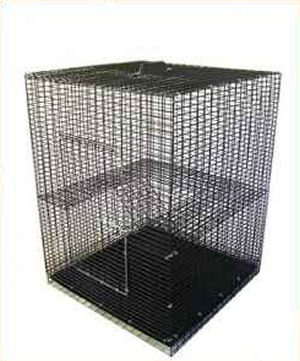
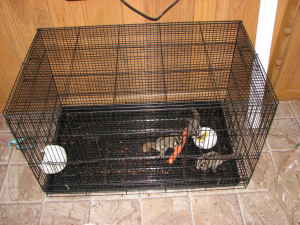
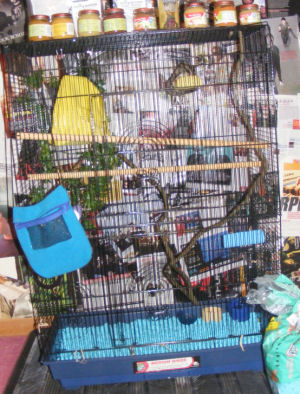
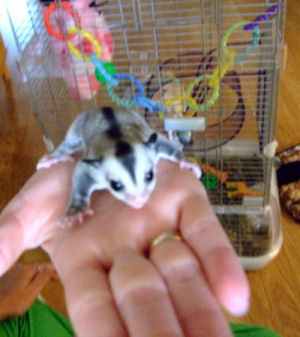
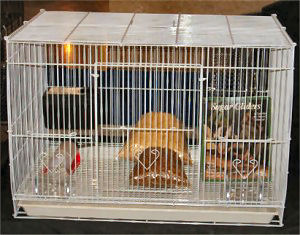
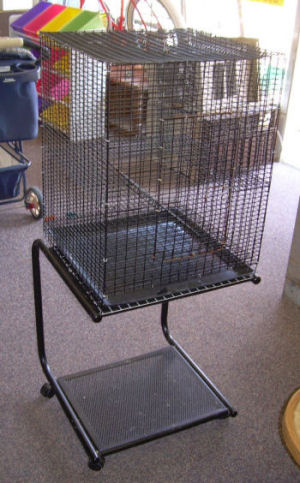
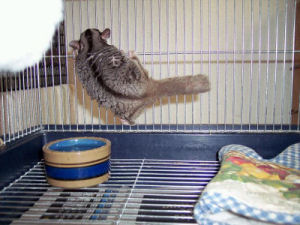
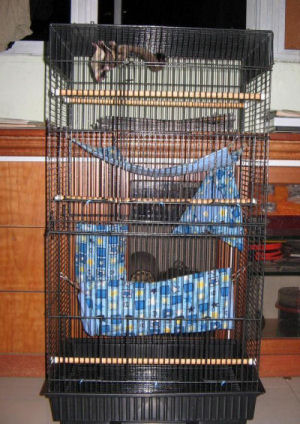
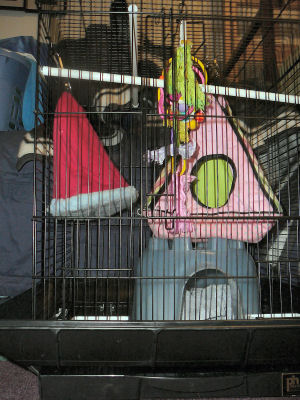
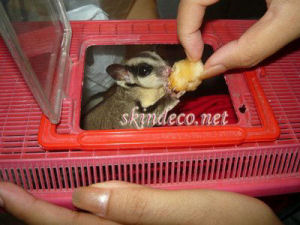
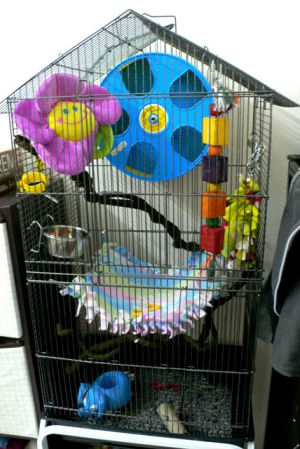
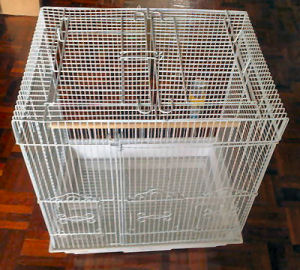
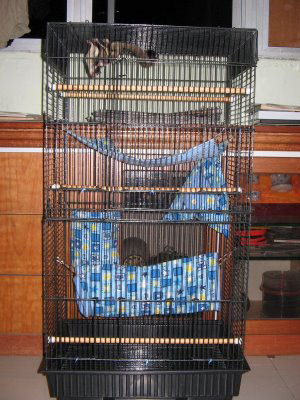
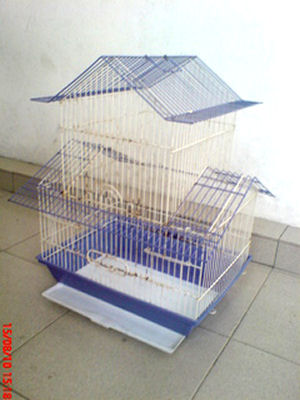

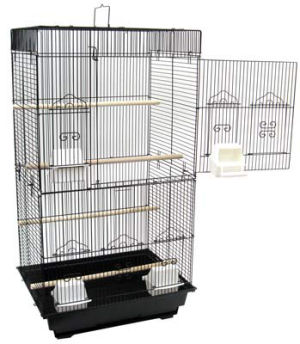
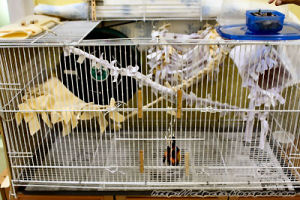
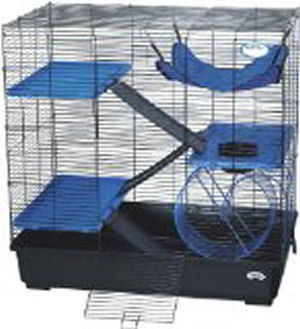
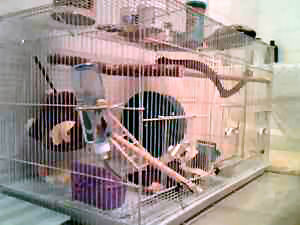
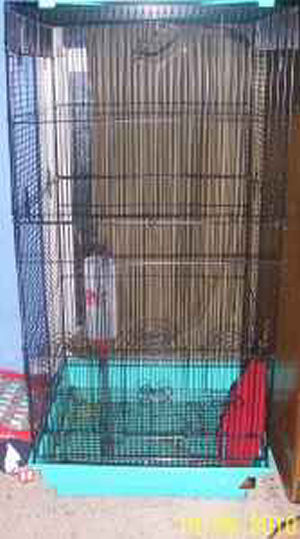
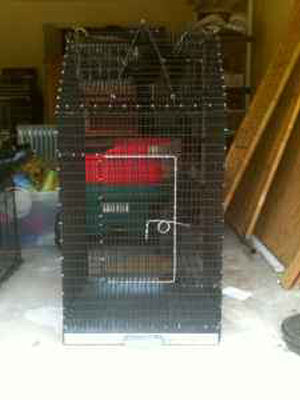
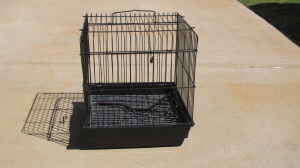
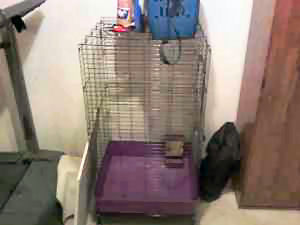
Sugar Glider Cages - A sad example
These images are far too many examples of poor cages for keeping sugar gliders. Each one has been pulled from a real Craigslist sugar glider post in order to present you a real-world problem. For a comparison, you can see some examples of popular acceptable cages HERE which are often referred to as flight, aviary or tower styles.
Size:
Each one of these cages is too small for even a single animal. A few of these might be used as "temporary" cages for introductions, medical issues or other various reasons, but not a single one is adequate for long term keeping of a single animal. Odds are that the cage which came with your sugar glider(s) is way too small. Most breeders, flea market or fair sellers, mall kiosks or pet shops will offer a cage that is very small and unacceptable.Understanding that sugar gliders are arboreal (tree dwelling), you can realize that their cage requirements might not be the same as they are for common rodents of the same size. Much like squirrels, sugar gliders live in the tree tops and commonly leap and glide large distances in the course of an evening outing. There is no real way to duplicate this in a caged environment, but one can at a minimum allow for a very large "flight", "aviary" or "tower" style of cage and also install all sorts of branches, shelves, floors, cubbies, boxes, pouches and anything else you can devise for them to romp around on and explore. The honest truth to what kind of cage you should keep your sugar glider(s) in is simply the largest one that you can find, afford or make.
Stimulation:
Many of these examples have absolutely nothing in them. Sugar gliders are cerebral animals and they need daily mental stimulation in order to be healthy. In the wild these animals have to work constantly to survive which includes endless activity and interaction while awake. Small cages with nothing in them lead to mental disorder behaviors which are generally non-correctable after the fact. Exercise wheels are an absolute must. Pouches are a must. Bird toys, boxes, chains, tunnels, swings, slings, tents, and so forth can all be used to give the animal something to have while imprisoned in a cage environment.Comfort:
Many of these examples have very little to no comfort inside the cage. Thin bare wires are very difficult on sugar glider feet long term. This can lead to malformed feet, pain and possible self mutilation and death. It is very easy to add more comfort to any cage by simply covering the floor grate with a fine plastic mesh or fleece. You can easily install solid shelves in order for the animal to perch while at rest. All of the items listed in the previous paragraph are also good examples of comfort items.Additional thoughts:
- Two water bottles per cage is common practice to prevent accidental dehydration. This makes it easier on you and the animals. One of the examples shows an empty water bottle which is bad news.
- You can repurpose unused hardware such as ladders and shelves covered in mesh to make a second floor in the cage for additional room to place toys and other things to explore.
- Budget cage lift-up doors are dangerous.
- Sugar gliders should not have direct access to their waste or substrate. A raised floor cage is needed so that the mess can fall through typically to a newspaper layered drop pan
- Sugar gliders are tree-dwelling, and much like birds, they poo and pee absolutely everywhere. Cage walls and surfaces need to be kept clean.
- Nails have to be actively maintained which is often too much effort for new owners.
- Diet is an expansive topic and is often too much for new owners to manage correctly.
- Being colony animals, two is the absolute minimum number of animals you should have. A single animal will most likely suffer long term mental distress no matter how much you play with it for the first six months. They need each other for interactions that human contact simply cannot substitute for.
- Bonding is a thing that animals do with each other; their own species. Sugar gliders do not bond with humans, they are tamed. Human companionship is not a replacement for another animal of its kind. Keeping 2+ animals as a colony does not hinder taming in any way and may in fact assit it as the animals begin to compete for treats and attention.
- There are a whole lot of health issues to become aware of in order to be able to identify the signs of and also work to prevent. Very few vets are experts with sugar gliders and it is hard to get good professional advice when one is sick. As an exotic animal owner, you must be aware of specific health issues in order to help your vet diagnose and treat.
These items listed above are brief and only a few of the many things a sugar glider owner must know to be successful. This post is designed to start you on the quest for learning. You are welcome to visit the Sugar Glider Encyclopedia and come read through, search and join in any of the forum discussions. The sugar glider chatroom is often busy in the evenings for real-time interaction with other owners.
You are welcome to come discuss this article to add/modify some of the content or simply leave a comment.
Please read my other two introductory articles: Christmas Sugar Glider , My Sugar Glider Is Sick!
Life is full of questions, never be afraid to ask any of them. Please never stop learning and always share what you learn with others.
Responses:
I just wanted to say thank you for for your post. Many people don't realize what can go wrong with gliders, they also don't realize they are not good pets for kids or alot of people really. They require ALOT of care and work. - Christy
Thanks so much for posting this. I adopted a glider from craigslist and he came in a horrible tiny $15 bird cage. -Taylor
What an excellent post! Thank you for being so caring and putting this together in one place! I have 6 girls. 4 are in the Oriental Tall and the other two in the Brisbane. Everybody has plenty of room! Kudos to you!!! Whomever you are!!! -Evelyn
Thanks for that. I often see glider sellers on CL who are unable to write a simple declarative sentence, free of spelling and grammatical errors. Seems to me that these folks do not possess the knowledge and skill needed to care for such a fragile animal. -Dr R Hamilton
Thanks for the info. I always wanted a sugar glider, but after reading this, i think i will leave to someone better able to care for them. -Rebecca
Thank you for the craigslist post about cages!! We are considering gliders, but have a lot to learn! -Gabrielle
Hello, I just wanted to say "thank you" for your craigslist post on improper sugar glider care. I own two gliders myself and it was actually painful to see some of the conditions that other people were forcing their gliders to live in. Hopefully your post will educate current owners and make potential new owners more conscious of the time and work involved in keeping gliders happy and healthy. again thank you -Christine
Hi, we have just recently found out about sugar gliders. I do not think that we are going to get any though because believe it or not we did think of some of the things that you mentioned. I think it is awesome that you took the time to hopefully make people think about how they cage any animal. I hope people really do their research so that all animals are cared for properly. Thank you -Cheryl
Who are you? You are my damn hero! rofl!!!!
I love your post. Do you mind if I print it out and hand out to people who purchase sugar gliders from me? I just had someone return a pair after 2 weeks because they didn't have time. Even after telling them what type of cage was inappropriate, they purchased one that is on your list. It is a piece of garbage and already falling apart. -Dawn
I don't know who you are but I appreciate your post so much on Craigslist! I have seen some horrible conditions that people try to claim are ok for their gliders! I have 4 myself and the smallest cage I have is 5' tall. Hopefully this will try and deter people from buying one on a whim and not knowing what they are getting themselves into. -Jennifer
I have been researching sugar gliders and their care for awhile, and have been considering adding some to my family soon. There is varied and contradictory information all over the web ... and it helps to have concise and scientific resources for those of us considering this important commitment!! Thanks for your post!! -Trish
I just wanted to say thank you for for your post. Many people don't realize what can go wrong with gliders, they also don't realize they are not good pets for kids or alot of people really. They require ALOT of care and work. - Christy
Thanks so much for posting this. I adopted a glider from craigslist and he came in a horrible tiny $15 bird cage. -Taylor
What an excellent post! Thank you for being so caring and putting this together in one place! I have 6 girls. 4 are in the Oriental Tall and the other two in the Brisbane. Everybody has plenty of room! Kudos to you!!! Whomever you are!!! -Evelyn
Thanks for that. I often see glider sellers on CL who are unable to write a simple declarative sentence, free of spelling and grammatical errors. Seems to me that these folks do not possess the knowledge and skill needed to care for such a fragile animal. -Dr R Hamilton
Thanks for the info. I always wanted a sugar glider, but after reading this, i think i will leave to someone better able to care for them. -Rebecca
Thank you for the craigslist post about cages!! We are considering gliders, but have a lot to learn! -Gabrielle
Hello, I just wanted to say "thank you" for your craigslist post on improper sugar glider care. I own two gliders myself and it was actually painful to see some of the conditions that other people were forcing their gliders to live in. Hopefully your post will educate current owners and make potential new owners more conscious of the time and work involved in keeping gliders happy and healthy. again thank you -Christine
Hi, we have just recently found out about sugar gliders. I do not think that we are going to get any though because believe it or not we did think of some of the things that you mentioned. I think it is awesome that you took the time to hopefully make people think about how they cage any animal. I hope people really do their research so that all animals are cared for properly. Thank you -Cheryl
Who are you? You are my damn hero! rofl!!!!
I love your post. Do you mind if I print it out and hand out to people who purchase sugar gliders from me? I just had someone return a pair after 2 weeks because they didn't have time. Even after telling them what type of cage was inappropriate, they purchased one that is on your list. It is a piece of garbage and already falling apart. -Dawn
I don't know who you are but I appreciate your post so much on Craigslist! I have seen some horrible conditions that people try to claim are ok for their gliders! I have 4 myself and the smallest cage I have is 5' tall. Hopefully this will try and deter people from buying one on a whim and not knowing what they are getting themselves into. -Jennifer
I have been researching sugar gliders and their care for awhile, and have been considering adding some to my family soon. There is varied and contradictory information all over the web ... and it helps to have concise and scientific resources for those of us considering this important commitment!! Thanks for your post!! -Trish